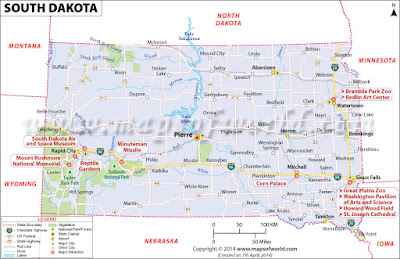Day 16 (D-47) Custer, the city / Custer, the man
Day 16 (D-47) Custer, the city / Custer, the man
Custer the State Park; Custer, the town; Custer, the man.
We visit Custer State Park on our third day. The town of Custer is thought to be the oldest town established by European Americans in the Black Hills of South Dakota and Wyoming. Gold was found there during the 1874 Black Hills Expedition, a discovery which initiated the Black Hills Gold Rush.
Population for 2016 --> 2,067
The name of the park and name of the town come from the name of the man:
The name of the park and name of the town come from the name of the man:
George Armstrong Custer (December 5, 1839 – June 25, 1876) was a United States Army officer and cavalry commander in the American Civil War and the Indian Wars.
Certainly you have seen the 1970 film with Dustin Hoffman, Little Big Man. Here's the trailer.
https://www.youtube.com/watch?v=0NiMmpf31QY&list=PLLMFf-IXN4eU3a-IoAHhjS3Rg1xFGH_DO (2 minutes and 32 seconds)
https://www.youtube.com/watch?v=0NiMmpf31QY&list=PLLMFf-IXN4eU3a-IoAHhjS3Rg1xFGH_DO (2 minutes and 32 seconds)
Little Bighorn
Following the American Civil War, as the still-young country looked to settle the West, it needed to defeat the Lakota Sioux and Southern Cheyenne that dominated parts of the frontier. To that end, the 7th Cavalry was created and Custer was placed in its command. After serving a brief suspension for deserting his post in 1867, Custer returned to action the following year and participated in several small battles against Native Americans in the region over the next several years.
But Custer's legendary bravery in battle would prove to be his undoing when, in 1876, the United States ordered an attack intended to crush the Lakota and Cheyenne. Though the plan was for three separate forces—one of which was led by Custer—to surround and overwhelm them, Custer and his men advanced more quickly than the other two units, and on June 25 Custer ordered his 210 men to attack a large Indian village.
On the other side of the attack was Sitting Bull, the revered Lakota chief who had originally wanted peace at Little Bighorn. Custer, however, was determined to fight. Against the onrush of thousands of Lakota, Arapaho and Cheyenne warriors, Custer and all of his men were surrounded, overwhelmed and killed.
Last Stand
The Battle of Little Bighorn was a stinging embarrassment to the U.S. government, which redoubled its efforts and quickly and cruelly defeated the Lakota.
For his role in the battle, Custer earned himself his place in American history, though certainly not in the way he would have wished for. During her final years, Custer's wife wrote accounts of her husband's life that made him look like a hero, but no story could erase the debacle that became known as Custer's Last Stand.
My best,
Jane
My best,
Jane
____________________________
--trailer = un teaser!
--settle = make their homes
--undoing = A cause or source of ruin; downfall
--overwhelm = overpower
--onrush = an advance or attack
--undoing = A cause or source of ruin; downfall
--overwhelm = overpower
--onrush = an advance or attack
--surrounded = encerclé
--overwhelmed = https://www.wordreference.com/enfr/overwhelmed stinging = A hurtful quality or power
--to defeat = vaincre
--accounts = a description of facts, conditions, or events
--erase = eliminate
--erase = eliminate



Comments
Post a Comment